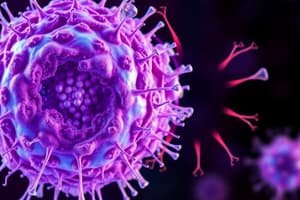Podcast
Questions and Answers
Flashcards are hidden until you start studying
Study Notes
Prokaryotic Cells
- Prokaryotic cells are simple, unicellular organisms without a nucleus or membrane-bound organelles.
- They have a rigid structure called the cell wall that provides support and shape.
Fimbriae
- Fimbriae are surface appendages that allow bacteria to adhere to surfaces.
- They are crucial for the colonization of surfaces and contribute to bacterial virulence.
Capsule Function
- A bacterium's capsule serves a protective role against environmental threats and immune responses.
- Capsules can enhance a bacterium's ability to cause disease.
Nucleoid Region
- The nucleoid region is where the bacterial DNA is located, indicated by letter D in diagrams.
- Unlike eukaryotic cells, bacteria do not possess a true nucleus; their DNA is concentrated in the nucleoid.
DNA Location
- Bacterial DNA is found exclusively in the nucleoid region, as bacteria lack nuclei.
Protein Synthesis
- Ribosomes are the sites of protein synthesis within the bacterial cell.
- They facilitate the assembly of amino acids into polypeptides (proteins).
Cell Wall Structure
- The cell wall is a rigid feature outside the plasma membrane that supports and protects the bacterium.
- It plays a critical role in maintaining cell shape and preventing lysis in hypotonic environments.
Plasma Membrane Function
- The plasma membrane acts as a selective barrier, regulating the entry of nutrients and the exit of waste.
- It maintains homeostasis within the bacterial cell.
Protein Synthesis Overview
- The first step in polypeptide synthesis is the transcription of DNA into messenger RNA, which occurs in the nucleus.
- Transcription involves transferring genetic information from DNA to mRNA.
Mitochondria Presence
- Mitochondria are essential organelles found in all eukaryotic cells, including both plant and animal cells.
- They are involved in energy production through cellular respiration.
Studying That Suits You
Use AI to generate personalized quizzes and flashcards to suit your learning preferences.




